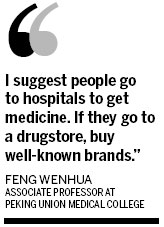Hong Kong warns of vitamin C knock-off
Updated: 2013-06-20 07:37
By Wang Qingyun in Beijing and Kahon Chan in Hong Kong (China Daily)
|
||||||||

Hong Kong health authorities have issued a warning that a popular medicine on the mainland may contain ingredients that do not match what is listed on the bottle.
In an announcement on Tuesday, the Hong Kong Department of Health said it suspects the product may have caused a woman to suffer a breakdown of muscle fibers.
According to the department, the suspicious product's label shows Tong'an Pharmaceutical in Shenzhen, Guangdong province, as the manufacturer.
The mainland's Food and Drug Administration responded on Wednesday that no phenacetin and aminophenazone - two medical chemicals banned in Hong Kong due to severe side effects - was found in medicine with the same batch number as that exposed by Hong Kong health authorities in a sample test. The test was conducted by the medical authorities in Shenzhen.
A 41-year-old woman was admitted to Princess Margaret Hospital for muscle fiber breakdown and abnormally low levels of potassium in her blood in October. She told her doctor in June she had taken a product called Wei C Yin Qiao Pian. Wei C means vitamin C in Chinese.
According to the Food and Drug Administration, the medicine, which is produced by many pharmaceutical companies and popular for the treatment of colds, should contain 10 herbal ingredients and three chemicals - vitamin C, paracetamol and chlorpheniramine maleate.
Yet Hong Kong's Department of Health said it detected none of the three chemicals in the product.
It also said it found phenacetin and aminophenazone, though the patient's doctor said a link between the chemicals and her symptoms has yet to be found.
"An adverse drug-related effect was suspected clinically," said the department, adding that the medicine is banned from sale in Hong Kong because its regulations require all proprietary Chinese medicine to contain only "materials of herbal, animal or mineral origin customarily used by the Chinese".
The department said the patient bought the product on the mainland.
Feng Wenhua, associate professor at the Institute of Materia Medica of the Chinese Academy of Medical Sciences and Peking Union Medical College, said it is likely the woman purchased fake medicine.
"Phenacetin and aminophenazone were widely used to ease pain and fever, like aspirin," he said. "But phenacetin is banned on the mainland, and aminophenazone is rarely used in human medicines. Neither of the chemicals is allowed in Wei C Yin Qiao Pian."
However, he admitted that drug authorities don't authorize new medicines combining traditional Chinese medicines and Western medical chemicals anymore because there may be unpredictable reactions if the two are blended.
A woman in Tong'an Pharmaceutical's sales department who declined to be identified said it is "impossible" that the product contains additional ingredients.
"Vitamin C, paracetamol and chlorpheniramine maleate are easily accessible and not expensive; there is no need for us to change the ingredients," she said.
The Food and Drug Administration said the medicine is popular, and is sample-tested every year.
"We have sample-tested three batches of the medicine this year, of which two were made by Tong'an Pharmaceuticals. All of them passed the test," said the administration. It added that the medicine had caused 14 cases of adverse reaction, but the symptoms observed were hives, rash and sleepiness, instead of the symptoms the Hong Kong health authorities described.
It advised the public to buy medicine through lawful means to avoid knock-offs, and to strictly follow doctors' instructions to lower the risk of adverse reaction.
The Hong Kong Health Department also advised the public "not to buy or consume products of unknown composition or from doubtful sources".
Feng agreed. "I suggest people go to hospitals to get medicine. If they go to a drugstore, buy well-known brands," he said.
Contact the writers at wangqingyun@chinadaily.com.cn and kahon@chinadailyhk.com
Li Yifei in Shenzhen contributed to this story.
(China Daily USA 06/20/2013 page6)

 Michelle lays roses at site along Berlin Wall
Michelle lays roses at site along Berlin Wall
 Historic space lecture in Tiangong-1 commences
Historic space lecture in Tiangong-1 commences
 'Sopranos' Star James Gandolfini dead at 51
'Sopranos' Star James Gandolfini dead at 51
 UN: Number of refugees hits 18-year high
UN: Number of refugees hits 18-year high
 Slide: Jet exercises from aircraft carrier
Slide: Jet exercises from aircraft carrier
 Talks establish fishery hotline
Talks establish fishery hotline
 Foreign buyers eye Chinese drones
Foreign buyers eye Chinese drones
 UN chief hails China's peacekeepers
UN chief hails China's peacekeepers
Most Viewed
Editor's Picks

|

|

|

|

|

|
Today's Top News
Shenzhou X astronaut gives lecture today
US told to reassess duties on Chinese paper
Chinese seek greater share of satellite market
Russia rejects Obama's nuke cut proposal
US immigration bill sees Senate breakthrough
Brazilian cities revoke fare hikes
Moody's warns on China's local govt debt
Air quality in major cities drops in May
US Weekly

|

|







